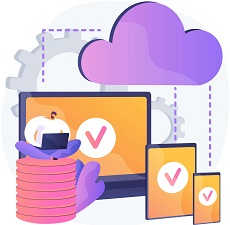A 5-megabyte drive weighed more than 2,000 pounds and needed an entire cargo plane in 1956. At least 2.5 quintillion bytes of data are produced every day in the modern world. Plus, you can put it away without a plane or a pin.
The ability to instantly generate, process, store, and retrieve such enormous data sets is thanks to what, exactly? Web-based computing services. The cloud servers that hold the quintillion bytes of data we generate expand in size and capacity every minute.
Purchases made while sitting at home in front of a computer. Taxi-hailing. Internet-based video playback. Subscribing to a music streaming service. Lack of consciousness while using social media. The cloud supports almost every aspect of our daily online lives. It has become the steel skeleton upon which the entire IT industry rests.
If this is the case, then telephony, the most common form of communication, should also move to the cloud, right?
Cloud-based telephone service has been around for at least two decades. But only recently has cloud telephony become available and, more importantly, usable, for the masses.
Even if you aren't aware of it, you may already be making and receiving calls through a cloud-based system.
Online phone systems that operate in the cloud rely entirely on software and do not need traditional telephone equipment. When you use a cloud phone system, you'll make and receive calls via a web app, a mobile app, or a CTI (Cloud Telephony Integration)
How does a cloud-based system work differently than a phone system installed on your own premises? Instead of using an old-fashioned analog system, modern businesses can switch to a more advanced cloud phone system. VoIP is used to send and receive voice data.
Therefore, RSoft's cloud-based system can provide significantly more features and benefits than traditional, on-premises phone systems.
Benefits of a cloud-based phone system

There are many advantages to using a cloud-based telephone system for a business, including improved communication and teamwork. These enhancements build upon what traditional on-premise phone systems have previously offered. Choosing a cloud-based telephony solution means you won't sacrifice any of the advantages of an on-premises system, and you'll enjoy even more.
The absence of obnoxious maintenance
There is no need for traditional infrastructures like phone lines or desk phones with cloud phone systems. They need absolutely no telephone equipment. Because of this, you can significantly cut down on time spent maintaining your telephone systems. As technology changes, there is no need to worry about upgrading or fixing your desk phones.
Instant onboarding
Quickly getting started is a breeze with cloud-based phone service. They typically exist in software-as-a-service (SaaS) products that require little to no hand-holding to get up and running. Call routing rules, IVR menus and submenus, and many other features can all be configured in a matter of hours.

Device Friendly

To set up a cloud-based phone system, you need no special hardware. All you need is a computer, smartphone, IP phone, or any other internet-capable telephone device. A cloud phone system is a service that allows users to make and receive phone calls through a web browser or mobile app Consequently, it is a phone system that works with any and all electronic gadgets.
Scales with your business
Your company's rate of growth may be difficult to predict. You can rest assured that the cloud-based phone system will grow with your company. You can easily acquire new virtual phone numbers, staff up with additional agents, develop an extensive interactive voice response menu, set up various routing rules, and much more to better serve your company. Lock-in periods for resources you might not use are unnecessary.

Extraordinary sound quality
Voice over Internet Protocol (VoIP) is an internet-based voice transmission technology used by cloud phone systems. It is considered superior to analog connections because digital clarity is provided to voice data. Similar to high-definition (HD) online streaming and cable television.
Low Investment
A cloud-based phone system eliminates the need for on-premises telephone equipment, individual workstation handsets for staff members, and lengthy contracts with a single provider. It's cheap to launch and expand. Compared to traditional, on-site phone systems, the price of VoIP phone service is much lower.

Remote Working

The members of your team can be located anywhere and still be able to communicate effectively, thanks to the cloud phone system. As was previously mentioned, cloud phones require no special hardware to function. Because of this, your distributed teams can access the phone system whenever and wherever they like. This is essentially the definition of working remotely. And this is made much easier by a phone service hosted in the cloud.
Operation Expansion
In the past, expanding your business meant renting an office space and installing phone lines to handle local inquiries. Cloud-based phone systems eliminate the requirement for physical hardware and software upgrades. Establish a base of operations in the United States and grow globally by opening branches in the United Kingdom, Australia, and elsewhere. In this regard, virtual phone numbers are helpful. In contrast to traditional phone numbers, virtual phone numbers can function over any internet connection. Even if they don't have a local office in a given location, they can still assist you in establishing local branches there.
Effective Collaboration
For a cloud-based phone system to function correctly, all team members must be physically present in the exact location. Agents, specialists, and managers who interact directly with customers can work from anywhere. They can be brought into the call quickly and easily with call conferencing features like call transfers to help resolve customer issues. Cloud-based phone systems also have extra features not found in on-premise options, such as the ability to record calls, transfer calls to a warm line, create a ticket at a help desk, etc.
AI voice capabilities

Inching closer to an AI-dominated world. AI machines are given high-volume, repetitive jobs that can be easily programmed. The precision and accuracy with which they can carry out these tasks exceed that with which we are capable.
In addition, the role of AI in cloud telephony is steadily expanding. Specifically, AI can provide much more accuracy and scalability than manual operations in
speech recognition and self-service areas. The good news is, cloud-based phone systems are prepared for AI. The capabilities of these systems can be increased twofold through simple integration with AI voice features or other AI systems. In the end, this causes a dramatic boost in output.
The old phones are on their last legs if they still work. Telephony in the cloud has arrived. A new world order where reliable connections are the norm, high-quality voice is standard, adaptability is expected, and expansion is simple.
Clouds surround us entirely at this point. We can't escape it. You can feel it working right now, even looking at your screen
Which would you pick if you could choose between an analog phone system and a modern RSoft Technologies cloud-based one?


